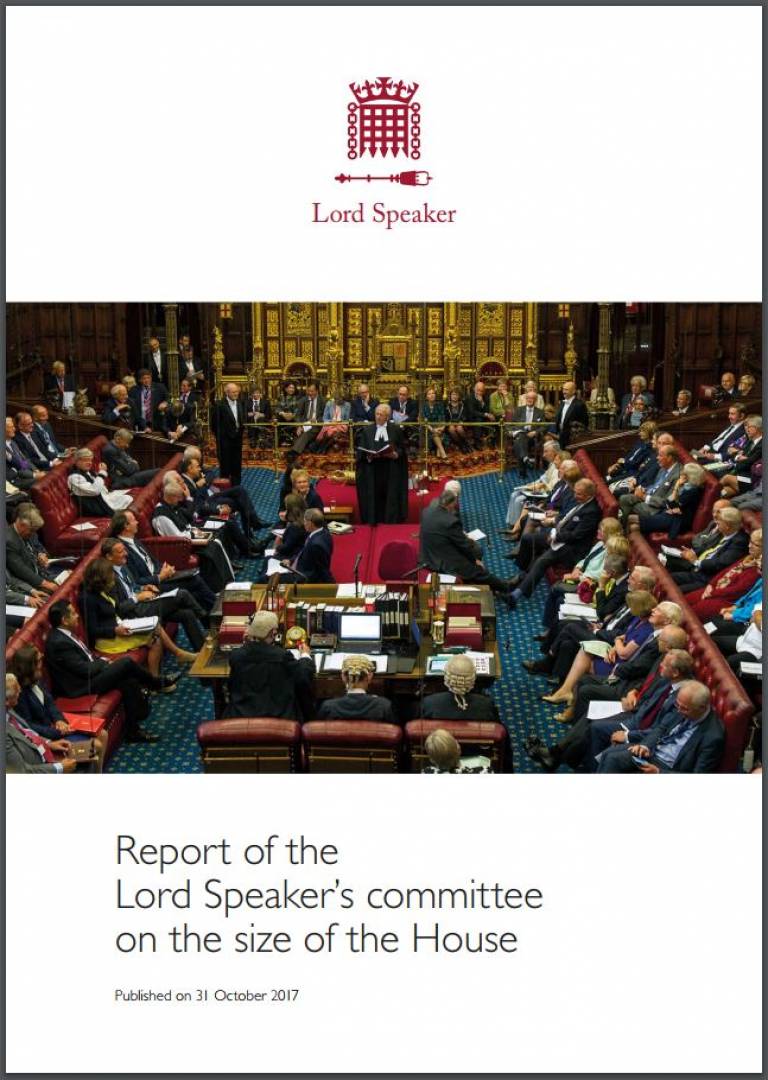Burns report on Lords size: a rare opportunity to be seized
31 October 2017

Today's proposals from the Lord Speaker's Committee on the Size of the House of Lords should be seized, says the UK's leading academic commentator on the Lords.
The committee proposes a move to 15 year appointments for all new Lords members (rather than the current life appointments), that the size of the chamber be capped at 600, and that the party groups work to targets to reduce their numbers to meet that limit. To respect the cap of 600 future appointments would also be limited, and linked to general election results.
Established by the Lord Speaker, Lord (Norman) Fowler, the 'Burns committee' report is the most significant intervention on Lords reform in many years - since Nick Clegg's failed bill in 2012. Rather than pursuing large-scale reform, it proposes an incremental change to deal with one urgent problem - the House of Lords growing size. Recognising the obstacles that have faced innumerable previous proposals for reform, it sets out changes that can be achieved without the need for legislation.
Constitution Unit Director Professor Meg Russell, one of the leading academic authorities on the House of Lords commented:
"Historically, Lords reform has proved extremely difficult. From Harold Wilson's plans in 1968 to Nick Clegg's in 2012, governments proposing radical change have consistently failed. The reforms that have succeeded (e.g. introduction of life peerages in 1958, removal of hereditary peers in 1999) have always been those that focus on the single most urgent next step on which there is widespread agreement, rather than achieving wholesale reform.
"The Burns report is carefully designed to tackle one of today's most urgent problems - the size of the House of Lords. There is almost universal agreement that this needs attention. In the best tradition of previous successful Lords reforms, this report is narrow in its scope, and focused on what can be implemented straightaway.
"It's easy to snipe at proposals such as these for being under ambitious, but the point is they are realistic. Those wanting more radical change must acknowledge that this hasn't happened yet, and isn't likely to happen any time soon. Those who are serious about the need to strengthen parliament, and cut the cost of politics, should welcome these proposals."
But Professor Russell did add one note of caution:
"These proposals require coordinated action across the party groups so that members of the House of Lords to retire to meet the targets. Importantly, peers seem ready to take this action. But the Prime Minister also needs to act for these proposals to succeed - to commit to limiting future appointments - if we are to achieve a smaller and more rational House of Lords."
Further information
- The Lord Speaker's Committee on the Size of the House of Lords was established in December 2016, and chaired by the Crossbencher and former senior civil servant Lord (Terry) Burns. Its report is published today.
- Professor Meg Russell is the author of two books on the House of Lords (most recently The Contemporary House of Lords: Westminster Bicameralism Revived, Oxford University Press, 2013) and numerous papers and reports on the subject. She has frequently given evidence to parliamentary committees, and acted as an external adviser to the Lord Speaker's Committee.
- Meg Russell's work has documented the growing size of the House of Lords, which has been a long-term problem but accelerated particularly under David Cameron's premiership. See her 2015 report Enough Is Enough: Regulating Prime Ministerial Appointments to the Lords.
 Close
Close


